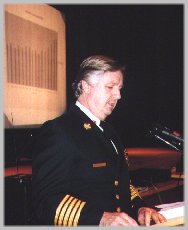By: Robert Avsec, Executive Fire Officer
In my previous post on the Executive Fire Officer Program, I wrote about how that experience had a positive

Author’s lapel pin from the National Society of Executive Fire Officers.
influence on my career development. I certainly did not have any intention of belittling my academic achievements, i.e., earning my undergraduate and graduate degrees.
I’m very proud of the fact that I earned both of those degrees while working full-time for the Chesterfield (VA) Fire and EMS Department. (Sidebar: During those years, 1986-2005, I served a cumulative 9+ years in staff positions, i.e., working M-F, 0830-1700, or more). Fact of the matter is, I was one of the “proud and the few” who pursued higher education in the Fire and EMS service before it was “cool”.
 The culture within Fire and EMS is changing regarding the pursuit of formal education beyond high school. Check out this really good take on the topic from Air Force Col. Robert Ditch (Ret.), Ed.D., president of Synaptic Emergency Educational Services, who spoke on the subject during the Officer Development Program at this year’s Fire-Rescue International Conference in Chicago.
The culture within Fire and EMS is changing regarding the pursuit of formal education beyond high school. Check out this really good take on the topic from Air Force Col. Robert Ditch (Ret.), Ed.D., president of Synaptic Emergency Educational Services, who spoke on the subject during the Officer Development Program at this year’s Fire-Rescue International Conference in Chicago.
I’m not going to “steal” Colonel Ditch’s “thunder”, but if you’re department’s culture has not yet caught up with that described by the Colonel I’ve got some advice (Imagine that, right?). Whenever I was asked by one of my folks (firefighters and officers I worked with), “How would a college degree help me put out a fire better?”, I always responded, “Not a bit better.” And I was being very honest.
But after that, I would go on to explain what I thought a college education can do for someone looking to move up and have a positive influence in their department. I feel that by pursuing that degree, a firefighter or fire officer is:
- Demonstrating commitment to a higher purpose. It’s not easy going to school when you’re a working adult—in my case it was just me and Mrs. Avsec—with family responsibilities. But all the studying, attending class—either in person or on-line—doing research, writing papers, etc., forces you to develop a sense of discipline that will pay dividends down the road in your career (Like when you’re in charge of the “big” project and you only have two weeks to bring it in, on time and under budget?).
- Developing their time management and planning skills. You are the “Incident Commander”—and all of the
 other ICS positions—for your college education “Action Plan”. You learn to take responsibility for developing your plan and implementing it…or not.
other ICS positions—for your college education “Action Plan”. You learn to take responsibility for developing your plan and implementing it…or not. - Developing your written communication skills. I always found that when writing for an “audience”, you either “upped your game” or you got trounced. Writing for the critical eye of a professor or peer review only helps you to develop a level of writing that will serve you well as an officer. Know any officers who can’t successfully communicate upward and downward in their organizations using the written word? Or with agencies or departments outside of the department? Didn’t think so.
- Developing research skills. If Fire and EMS organizations are to not just survive, but thrive, in uncertain and turbulent times it will be because we’ve gotten better at information-driven decision making. Good staff officer work in any organization, not just Fire and EMS, comes from good data collection, analysis, development of a range of options and recommendations for the bosses to consider.
Gone are the days—in most places—when a Fire Chief could get the resources their department needed simply by using the “I think, feel, or believe” methodology. Governing bodies, e.g., city councils, county boards, etc., and overhead positions, like the city manager or county administrator, are demanding a higher degree of accountability from all departmental level leaders and the Fire Chief is no exception.
I thought all of the above were true before I retired from the department in December 2007, and I believe it even more fervently today. Read the trade journals–hard copy and on-line–pay attention to what’s posted on social media like Twitter and Facebook and I think you’ll agree that the majority of what makes news and puts our  business in a “bad light” is the outcome of a lack of professionalism. (If you can ignore the photos of scantily clad women, rants against the government, religious posts, anything and everything for sale, etc. Is it just me, or has Facebook become the 21st century version of a medieval marketplace in England, circa 1245? ).
business in a “bad light” is the outcome of a lack of professionalism. (If you can ignore the photos of scantily clad women, rants against the government, religious posts, anything and everything for sale, etc. Is it just me, or has Facebook become the 21st century version of a medieval marketplace in England, circa 1245? ).
I’m speaking of their level of professionalism in the way that they develop, or don’t develop, policy and procedures for their organizations. In the way that they manage their people. In the way that they manage their relationships with stakeholders and external groups. In the way that they manage their fiscal resources.
 Yes, the community expects a fire truck to show up at their fire when they call 911 and they expect that the firefighters to know how to put out the fire when they get there. But the community doesn’t expect that their Fire and EMS department will be the subject of a sexual harassment case resulting in a judgement against the city and department to the tune of $1.2 million in today’s economy. They don’t expect that fire apparatus and ambulances will not be available for duty because of mechanical problems resulting from a lack of maintenance.
Yes, the community expects a fire truck to show up at their fire when they call 911 and they expect that the firefighters to know how to put out the fire when they get there. But the community doesn’t expect that their Fire and EMS department will be the subject of a sexual harassment case resulting in a judgement against the city and department to the tune of $1.2 million in today’s economy. They don’t expect that fire apparatus and ambulances will not be available for duty because of mechanical problems resulting from a lack of maintenance.
I’m not saying that a more educated officer corps will prevent those kinds of things from happening in a department, but I am saying that I believe that it will reduce the organizational risk to a large degree.
 Fire & EMS Leader Pro The job of old firefighters is to teach young firefighters how to become old firefighters!
Fire & EMS Leader Pro The job of old firefighters is to teach young firefighters how to become old firefighters!